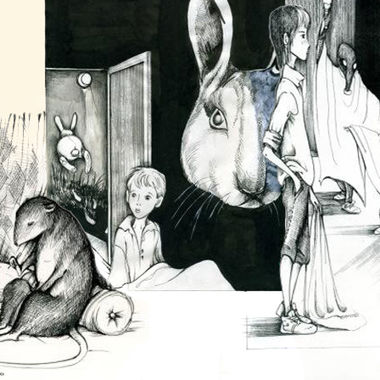
Կարդալ հայերեն
This brief speech was to be delivered on the occasion of Glagoslav Publications’ printing of books by contemporary Armenian authors, and their exhibition at the 2020 London Book Fair. However, because of the COVID-19 pandemic, the fair was canceled.
Many people will recognize this quote by Dr. Samuel Johnson: “No man but a blockhead ever wrote except for money.” With a delicate upheaval of the words and grammar, the meaning can be changed completely to something like “For money, no man but a blockhead would ever write.”
These words, belonging to Johnson, but slightly upended by me, do a good job of describing the brief philosophy and objectives behind the writing industry in Armenia today. Fortunately, that industry does not yet pursue astronomical sums of money, nor does it seek to conquer that mythical creature often referred to as the “the global book market;” it does not wage a principled battle of winning over the reader at any cost.
In all probability, everyone would like to be translated and read in different languages, including the most misanthropic and reclusive writers. Even today, the irritable Jonathan Swift—or, if we look at the latter half of the 20th century, Thomas Bernhard and Arno Schmidt—would not be averse to seeing their books in the bestseller list (or at least admitting this to themselves, although even this seems quite doubtful). Of course, it would have been a different story if we had a large and agile book market in Armenia, with massive print runs and the strong foundation of a nationwide habit of reading. To be honest, I would not want such processes to develop in our country prematurely, with people occupied by frenzied copying, in a rat race to be first, a manic pursuit of money, aiming for an army of readers, advertising and self-promotion, the most extreme manifestations of which have nothing in common with the inner nature of literature and, on the contrary, consistently widen the abyss between originality and duplication.
Barthes would probability not have liked this, but it has become a reality – in our times, a writer (one who was seemingly obliged to “die” but never manages to do so) is more a subject of discussion than his or her creation. The situation is changing in the Armenian literature scene over the past few years – unfortunately, it is the imminent appearance of actions of imitation that is gaining ground and attracting young, upcoming writers.
I have no accurate statistical data on how many contemporary Armenian writers have been translated to English, nor on the volumes of translation completed overall in the 20th century. Nor, most importantly, on the quality of those translations (this is another subject of discussion). Nevertheless, there are not many translations. The noteworthy samples of old and new Armenian literature need to be translated again even if this has already been done before and there is a vital need for their discovery once more by readers all over the world. This is vital because, unfortunately, the feeling is still very much alive that we are living beyond the planet’s orbit, isolated within the hermetic and self-sufficient separation of Armenian art, while wishing inside that that world (again, when we speak of the world we mean only the West) would at least once find us worthy of a well-meaning and compassionate word, to look at us even if it is a condescending glance, which would be like charity to our starving and fearful souls.
In any case, as a result of the Internet and close interaction, the world continues to live in the same state while seeming to be decentralized and informed, even though the goal of profound cross-cultural understanding through literature has not yet been achieved. There is a simple reason for this – the translation of prose or poetry is not a news headline or a tweet, it is a piece of literature that demands time, contrasting thoughts, artful concentration and the ability to publish.
In 2017, on the initiative of Arevik Ashkharoyan, the director of the ARI Literary Agency and ARI Literature Foundation, Glagoslav Publications published my book Goodbye, Bird, translated to English by Nairi Hakhverdi, who worked in an extra sensitive and caring way with the fragmented and agonized language of the novel. This was the start of a partnership. In 2019, the collection of stories by Karine Khodikyan called The Door Was Open, and by Grig titled Jesus’ Cat were published, as was Susanna Harutyunyan’s novel Ravens Before Noah. With tireless effort and dedication to literature, one the best translators currently living in Armenia, Nazareth Seferian, produced the English versions of these books. And this partnership now continues, supported by the Ministry of Culture of Armenia.
It is not possible, for the most part, to talk about the preferences of the people that read books in English. What would be of interest to them in these books by Armenian authors published by Glagoslav? Each piece of work has a small portion of experience, the visible and concealed Armenian realities and fragments of events from Armenia. Take, for example, Karine Khodikyan’s book The Door Was Open, where a layered metaphorical language is used to describe the relationship between men and women as well as complicated political occurrences and the figures that suffered because of them, referencing the earliest, purest instinct of people facing up to biblical texts, folk talismans, childhood fears, tragedies and rulers moving towards dictatorship.
In Grig’s collection titled Jesus’ Cat, the writer chooses the monotonous and simple approach of first-person narration, following the day-to-day of people relegated to the margins of life, studying the spaces, feelings and routines that connect them to this world. The narrator of the stories in another world uses this autobiographical experience to speak and draw words from the mouths of his contemporaries from different countries being treated at a German hospital, trying to find and recognize the sometimes incomprehensible—at times, completely childish—behavior and concerns he and they share, caused by cohabitation and the same, decisive problems facing them all.
Susanna Harutyunyan’s Ravens Before Noah is one of those valuable, multi-faceted works that can reveal the unique palette of a person whose life encompasses the most difficult periods of twentieth-century Armenian history including the consequences of the Genocide, oppression in the Soviet era, as well as imagination, legend, and historic mysteries. The novel is a unique source of ethnographic material, from folklife to superstitious tradition, describing the behavior of people after surviving a tragedy as it is passed on from generation to generation, ending up a masked continuation of the same tragedy itself. An important factor in Ravens Before Noah—if not the main one—is the voice of a woman who is a victim of violence, who bears the stigma of fate, social stereotypes and masculinity. I believe that readers in English have an amazing opportunity to learn from this rich novel with its targeted messages.
It is difficult for me to present the novel Goodbye, Bird, which I have authored. I would simply like to say that the heroes of the book are born of violence, go towards violence and end within it. They are the result of the seeming benefits of all those defects, which cannot be avoided neither by punishment, nor through philosophical theories or psychotherapeutic means, as long as the reality in Armenia remains one that is fake and artificial, as long as the dignified and disciplined remain buried in the social thought of lies and self-deception, to this day.
I have titled this brief speech “The Importance of Difficult Steps” because I would like to reject and oppose the word “success.” There are still things that do not depend on “success,” even though they are important. Thus, in these difficult times when we often confuse success with what is important, the translation of Armenian literature and its subsequent publication by Glagoslav and presentation to English readers is definitely an occurrence of the utmost importance.
also read
The Eternal Magic of Mariam Petrosyan’s Gray House
By Lilit Margaryan
Translated into several languages, Mariam Petrosyan’s epic novel “The Gray House” has enchanted readers across the world. In this first book review, Lilit Margaryan speaks with the elusive Petrosyan about her life and the life of a novel that took 18 years to write.
When More is Less: Love and Cement in Revolutionary Yerevan
By Christopher Atamian
Christopher Atamian reviews “The Structure is Rotten, Comrade,” a new graphic novel by Viken Berberian and Yann Kebbi.
Thoughts on (not)Editing
By Tatiana Ryckman
In her piece on (not)editing Micheline Aharonian Marcom’s new novel “The Brick House,” author and editor Tatiana Ryckman says that Marcom's fiction changed her reading and writing life forever.







EVN Report welcomes comments that contribute to a healthy discussion and spur an informed debate. All comments will be moderated, thereby any post that includes hate speech, profanity or personal attacks will not be published.